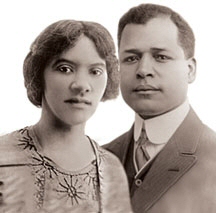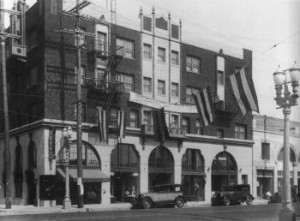
GOOD MORNING, PRAG-OBOTS!!
We continue our series on African American Hoteliers…
JOHN ALEXANDER SOMERVILLE
(1882-1973)

John Alexander Somerville emigrated to the United States from Jamaica around 1900. He and his wife, Vada Watson Somerville, were both graduates of the University of Southern California School of Dentistry. Graduating with honors in 1907, he was the first black graduate, and his wife was later the first black woman graduate. In 1914, only three years after its founding in New York City, the Los Angeles branch of the NAACP was created at the home of John and Vada Somerville. His first major business venture, the Somerville Hotel, was a principal African American enterprise on Central Avenue, in the heart of the Los Angeles African American community. When it opened in 1928 it was one of the most upscale black hotels in the United States, and counted a number of African American celebrities among its guests.
With the onset of the Depression, the facility was sold and renamed the Dunbar Hotel in honor of the famed black poet. The scene for at least one black film, and a major community landmark for many years, the Dunbar Hotel declined in the 1960s, but has now been revived and has been designated a Los Angeles Historic Cultural Monument. In addition to developing other properties in the Los Angeles area, throughout the years both he and his wife were active in community affairs and civil rights work. In 1949 he published his autobiography, Man of Color, and in addition to being the second African American on the Los Angeles Chamber of Commerce, served on the Police Commission from 1949 to 1953. In 1953 he was named Officer of the Order of the British Empire by Queen Elizabeth II.
Originally named the Somerville Hotel and located on 41st street and South Central Avenue, it was erected in June of 1928 in reaction not only to the complete lack of first rate accommodations in Los Angeles for blacks who were denied service at white-owned hotels, but also by a need for employment and self-enterprise in the community.
Dr. John Somerville, the hotel’s namesake, was a Jamaican-born businessman and the first African American to graduate from the University of Southern California’s (USC) School of Dentistry. He would eventually become instrumental in opening the Los Angeles National Association for the Advancement of Colored People (NAACP) chapter, preside as its first president, become the second African American member of the Chamber of Commerce and serve on the Los Angeles police commission from 1949 to 1953.

Somerville’s project was aided by all-black laborers, contractors, craftsman, and donors from the local community. Three floors of finely furnished rooms were atop an expensive first floor featuring a plethora of stores and a dining hall complete with orchestra balcony. It was the first hotel built by black people; usually African Americans bought and refurbished old hotel buildings vacated by whites.
The Somerville Hotel took its place as the heart of African American culture in Los Angeles. Given its upscale atmosphere, the presence of Club Alabam within its premises, its prime location on a two-block strip of jazz clubs, and its virtual monopoly on accommodations for black people, every major African American dignitary visiting Los Angeles stayed there. Congressman Oscar DePriest, W.E.B. DuBois, Langston Hughes, and entertainers Bill “Bojangles” Robinson, Herb Jefferies, Louis Armstrong, Duke Ellington, Count Basie, Jimmie Lunceford, Lena Horne, and Billie Holiday were all guests at the Somerville. The first NAACP convention on the west coast was also held there in 1928.
After the Stock Market crash in 1929, Somerville sold the hotel to lawyer Lucius Lomax, who renamed it after poet Paul Laurence Dunbar. It continued to be the leading black hotel on the west coast in the 1930s and 1940s. In the 1950s, however, as housing covenants were abolished, the Dunbar Hotel’s business declined as well. The Watts Riots in 1965 exacerbated the exodus from South Central Avenue and by 1974 the hotel closed its doors.
In 1975 Bernard Johnson established the nonprofit Dunbar Hotel Black Cultural and Historical Museum, Inc, comprised of longtime activists and assorted professionals. Their organization successfully lobbied to get the Dunbar Hotel on the national register of historic places, but it was vacant and deteriorating until 1990 when it was rededicated as a museum and cultural center. The old rooms are now low-income housing and the surrounding neighborhood is mostly Latino.
With the onset of the Depression, the facility was sold and renamed the Dunbar Hotel in honor of the famed black poet. The scene for at least one black film, and a major community landmark for many years, the Dunbar Hotel declined in the 1960s, but has now been revived and has been designated a Los Angeles Historic Cultural Monument. In addition to developing other properties in the Los Angeles area, throughout the years both he and his wife were active in community affairs and civil rights work. In 1949 he published his autobiography, Man of Color, and in addition to being the second African American on the Los Angeles Chamber of Commerce, served on the Police Commission from 1949 to 1953. In 1953 he was named Officer of the Order of the British Empire by Queen Elizabeth II. – See more at: http://www.blackpast.org/aaw/somerville-john-alexander-1882-1973#sthash.FPXPbVkG.dpuf
With the onset of the Depression, the facility was sold and renamed the Dunbar Hotel in honor of the famed black poet. The scene for at least one black film, and a major community landmark for many years, the Dunbar Hotel declined in the 1960s, but has now been revived and has been designated a Los Angeles Historic Cultural Monument. In addition to developing other properties in the Los Angeles area, throughout the years both he and his wife were active in community affairs and civil rights work. In 1949 he published his autobiography, Man of Color, and in addition to being the second African American on the Los Angeles Chamber of Commerce, served on the Police Commission from 1949 to 1953. In 1953 he was named Officer of the Order of the British Empire by Queen Elizabeth II. – See more at: http://www.blackpast.org/aaw/somerville-john-alexander-1882-1973#sthash.XxG0HMFO.dpuf
With the onset of the Depression, the facility was sold and renamed the Dunbar Hotel in honor of the famed black poet. The scene for at least one black film, and a major community landmark for many years, the Dunbar Hotel declined in the 1960s, but has now been revived and has been designated a Los Angeles Historic Cultural Monument. In addition to developing other properties in the Los Angeles area, throughout the years both he and his wife were active in community affairs and civil rights work. In 1949 he published his autobiography, Man of Color, and in addition to being the second African American on the Los Angeles Chamber of Commerce, served on the Police Commission from 1949 to 1953. In 1953 he was named Officer of the Order of the British Empire by Queen Elizabeth II.
(SOURCE: Hidden Los Angeles)
